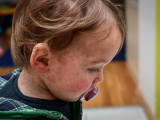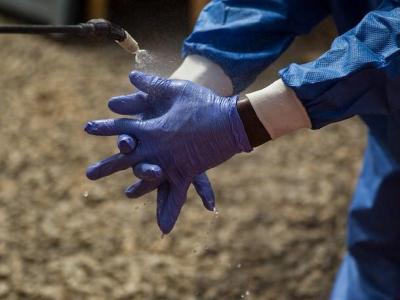Jul 20, 2011
EU reports another E coli outbreak death
The European Centre for Disease Prevention and Control (ECDC) said today that it has received three more reports of Escherichia coli O104:H4 infections from Germany since its update yesterday, along with notification of another German death linked to the outbreak. The newly reported cases and death involved hemolytic uremic syndrome (HUS), a potentially fatal kidney complication. Also, the ECDC reported two more suspected infections that don't have an HUS component. The new reports push the European Union's outbreak total to 3,919, including 768 with HUS and 43 deaths. Over the past few outbreak updates the ECDC has included a breakdown of confirmed and suspected E coli O104:H4 cases. It said 900 outbreak cases have been confirmed, 254 of them with HUS.
Jul 20 ECDC update
Federal partners launch new food-emergency training tool
The US Food and Drug Administration (FDA) today unveiled a new toolkit to help public health officials and their partners test their plans to work as a team in responding to unintentional or intentional food supply contamination threats. The Food Related Emergency Exercise Boxed (FREE-B) set is a Web-based group of five scenarios, such as produce contamination with E coli O157:H7, the FDA said today in a press release. Dr Michael R. Taylor, the FDA's deputy commissioner for foods, said "FREE-B helps people think about their own responsibilities in a time of crisis and how to best work with others involved." The FDA developed the tools with collaborators at the Centers for Disease Control and Prevention (CDC) and the US Department of Agriculture (USDA). The FDA said the tool fit the new Food Safety Modernization Act's goals of streamlining coordination between federal agencies and developing tools to help local and state agencies protect the nation's food supply. According to the FREE-B Web portal, the tool includes guides for facilitators and lead planners and a situational manual. Besides the E coli produce scenario, others include food product testing that prompts a trace-back investigation, an illness cluster linked to a food service establishment, intentional contamination of cattle with foot-and-mouth disease, and intentional contamination of raw meat with a chemical agent. The FDA said it is putting together a webinar to allow users to ask questions about the new tool and share their tips on how to use it.
Jul 20 FDA press release
FDA FREE-B Web site
Australia has four times as many flu cases as last year
Australia is experiencing a severe flu season so far, with more than four times as many cases reported as at this time last year. The National Notifiable Diseases Surveillance System (NNDSS) currently shows 8,557 cases so far this year, compared with 1,989 cases recorded between January and July 2010. Australia's Influenza Specialist Group, a not-for-profit group that works to raise public awareness about flu, suggested that more increases are likely as Australia heads into its traditional peak flu season of August to October, according to an Australian Associated Press (AAP) report yesterday. South Australia has been hit by a big increase in influenza B cases this year, with 982 reported, compared with 18 at this time last year, according to an Australian Broadcasting Corp (ABC) News report yesterday. Paddy Phillips, chief medical officer for the state, said about half of the patients have been between 5 and 19 years old. Dr. Alan Hampson, chair of the specialist group, said the reasons for the tough season are unclear.
Jul 19 AAP report
July 19 ABC News report
Study: Measles strain has caused 25,000 cases in Europe
The measles virus strain called D4-Hamburg, which first reached continental Europe in 2008, has caused more than 25,300 cases in 12 European countries over the past 27 months, with the vast majority of them in Bulgaria, according to a report published online yesterday in Emerging Infectious Diseases (EID). The virus spread from London to Hamburg in December 2008 and later moved to Bulgaria, which has had 24,379 cases so far. The virus is largely but not exclusively associated with travel by members of the Roma ethnic group, says the report by a large international research team. Cases have been identified in Poland, Ireland, Northern Ireland, Austria, Greece, Romania, Turkey, Macedonia, Serbia, Switzerland, and Belgium, and the virus was repeatedly re-imported to Germany. The authors say their findings "underline the need for the development of strategies to address this ethnic minority [the Roma] at the regional level and to improve their integration into the respective national health services." But they add that measles elimination "should not be seen exclusively as a Roma-associated problem," as public health authorities face a broader challenge of "closing vaccination gaps in a setting of optional vaccination and vaccine skepticism." Last week the ECDC reported that Europe has had more than 21,000 measles case so far this year, most of them related to a large epidemic in France.
WHO urges nations to ban commercial TB blood tests
Countries should ban commercial blood tests for diagnosing active tuberculosis (TB) and instead rely on accurate microbiological or molecular tests, the World Health Organization (WHO) said in a policy recommendation today. Use of currently available commercial blood tests "often leads to misdiagnosis, mistreatment, and potential harm to public health," the agency said in a press release. The WHO, which arrived at its policy statement after a 1-year expert review of the evidence, said that testing for active TB through antibodies or antigens in the blood is extremely difficult. It said false-positives or false-negatives can result from different antibody responses in different patients, antibodies to other diseases triggering a positive test, and the fact that different organisms can share the same antigens. "A blood test for diagnosing active TB disease is bad practice," said Dr Mario Raviglione, director of the WHO's Stop TB Department. "Test results are inconsistent, imprecise and put patients' lives in danger."
Jul 20 WHO report
Jul 20 WHO press release
Polio eradication goal in danger as Nigeria reports new cases
The goal of eradicating global polio by the end of 2012 is in grave jeopardy, according to a report today from an independent monitoring board (IMB) of the Global Polio Eradication Initiative (GPEI). The report cited a resurgence of the disease in the Democratic Republic of the Congo, Chad, and Angola, as well as an increase in cases in Pakistan, according to a GPEI press release. Sir Liam Donaldson, the UK's former chief medical officer who chairs the IMB, said that eradicating polio "is still feasible but more urgency is needed to complete it. The plan to stop transmission by the end of 2012 is not on track," according to the UK-based Guardian today. The GPEI listed seven "important positive signs" of eradication efforts, such as no recurrent cases in India, but cited a "deadly serious" global funding gap as it outlined continued polio hotspots.
Jul 20 GPEI press release
Jul 20 Guardian article
In related news, northern Nigeria has confirmed 20 new cases of wild poliovirus infection in six northern states, Agence France-Presse (AFP) reported yesterday. The country had reported only 21 cases last year after logging 338 in 2009. "In recent times, we have made some commendable strides in our commitment to kick polio out of Nigeria," said Jacques Boyer, deputy director of the United Nations Children's Fund for Nigeria. "However, there are challenges in sustaining the progress made in polio eradication as Nigeria is currently experiencing new polio outbreaks."
Jul 19 AFP report


















